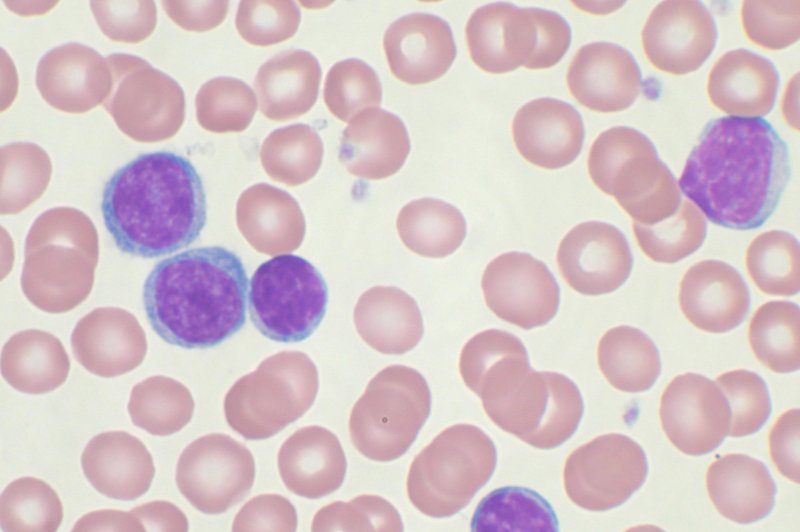Researchers at The University of Texas at Dallas have discovered a link between protein enzymes that bind together to promote tumor growth and by eliminating the enzymes from binding, may inhibit tumor growth. Pictured, peripheral blood smear showing chronic lymphocytic leukemia cells. Photo by Mary Ann Thompson/Wikimedia Commons
DALLAS, Dec. 14 (UPI) -- Researchers at The University of Texas at Dallas have discovered a link between two enzymes that in tandem may actually work to promote tumor growth in cancer patients.
Dr. Jung-Whan Kim, assistant professor of biological sciences and co-lead author of the study, examined the enzymes NQO1 and HIF-1a. On its own, NQO1 helps protect the body from cancer-causing damage of free radicals and environmental toxins like cigarette smoke.
HIF-1a aids in cell survival when oxygen levels in the body are temporarily low, a condition known as hypoxia. When optimal oxygen levels return, HIF-1a is degraded.
"There has been no reason to suspect these two proteins interact, but now we know they do," Kim said in a press release. "This finding was totally unexpected."
The findings, which were published in Nature Communications, reveal that NQO1 binds to HIF-1a and that by binding to HIF-1a in cancer cells, NQO1 regulates the partner protein by stabilizing it, preventing HIF-1a from being downgraded.
"Cancer cells, like any other cells, need oxygen to survive, but they grow really fast so they become hypoxic - therefore, they suffer from low oxygen," Kim said in a press release. "They try to adapt to or overcome this hypoxic stress through various mechanisms, one of which is to increase HIF-1a. This enzyme signals the body to make more blood vessels to feed the tumor and to reprogram cellular metabolism to adapt to hypoxia. Until now, though, no one had made a connection between HIF-1a and NQO1."
For the study, researchers examined colorectal cancer cells obtained from patients and found a significant link between high NQO1 and high HIF-1a levels. In other experiments, researchers eliminated the NQO1 in colorectal and breast cancer cells then injected these modified cells into immunocompromised mice while a control group received unmodified tumor cells.
"We saw tumor levels drop in mice that received cancer cells without NQO1," Kim stated in a press release. "Our experiments strongly suggest that this tumor growth was inhibited specifically through reduced NQO1-dependent HIF-1a activity."
The team is currently examining the role HIF-1a plays in certain types of lung cancer. He is working the Dr. Jung-Mo Anh, associate professor of chemistry and biochemistry, to identify molecules that may target and block HIF-1a in cancer cells.















